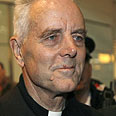
The Vatican has been working for years to bring the breakaway Society of St. Pius X back into its fold, and this week told its members they must accept some core church teachings if they want to be fully reintegrated into the church.
But the Holy See said some expressions contained in documents from the Second Vatican Council could be left open for "legitimate discussion."
The 1962-65 Vatican II meetings brought modernizing reforms to the Catholic Church, including outreach to Jews and introduction of the Mass in the vernacular rather than Latin. The Swiss-based Society of St. Pius X was formed in 1969, opposed to many of Vatican II's reforms.
The Vatican refused to say which core teachings the society must accept to be reintegrated, and which elements of Vatican II documents could be left open for discussion.
A key Vatican II document, Nostra Aetate, revolutionized the Catholic Church's relations with Jews by declaring that Christ's death couldn't be attributed to Jews as a whole. Other Vatican II teachings to which the society objects concern religious freedom and ecumenical relations.
The uncertainty over what is being required of the society provoked unease among some Jewish groups, which issued veiled warnings Friday about the possible impact on Vatican-Jewish relations were Nostra Aetate and other Vatican II teachings to be now considered ripe for discussion.
'Catastrophic effects' on Catholic-Jewish ties
Abraham Foxman, the Anti-Defamation League's US director, said he was confident that Pope Benedict XVI would require the society to accept the church's "positive teachings" about Jews before being fully reconciled with the church.
"It would be unthinkable for the Vatican to allow a Catholic breakaway sect that includes a Holocaust-denying bishop, Richard Williamson, to be reintegrated into the church while still being allowed to promote anti-Semitism and anti-Judaism," he said in a statement.
Elan Steinberg of the American Gathering of Holocaust Survivors and their Descendants, said there would be "catastrophic effects" on Catholic-Jewish relations if the Vatican didn't require the society to accept the document.
"We mustn't allow the moral imperative of Catholic-Jewish amity to fall victim to a policy of appeasement or blithe expediency," he said in a statement.
Even Rabbi David Rosen, who heads the American Jewish Committee's interreligious affairs office and is a veteran of Catholic-Jewish dialogue, said he was worried about the Vatican's gesture and awaited further clarification.
"If 'Nostra Aetate' and 'Lumen Gentium' (another Vatican II document) are not considered fundamental doctrines of the Church, and it is possible to question them without challenging the authority of the church, then we (and not just Jewish-Catholic relations) are in for a very rough ride ahead," he said in an email.
The society's superior, Bishop Bernard Fellay, has said he would study the two-page document of core church teachings handed over to him by the Vatican and respond.
The German-born Benedict has worked for two decades, as pope and as cardinal, to bring the group back into the Vatican's fold, eager to prevent further schism and the expansion of a parallel church.
Benedict, who has won praise from Jews for his decades of outreach, nevertheless provoked outrage in 2009 when he lifted the excommunication of Williamson, who denied gas chambers were used during the Holocaust.
Williamson, Fellay and three other bishops were excommunicated in 1988 after the society's founder consecrated them without papal consent.
The society has six seminaries, three universities and 70 primary and secondary schools around the globe. Aside from the four bishops, it boasts more than 550 priests and 200 seminarians.
- Follow Ynetnews on Facebook















